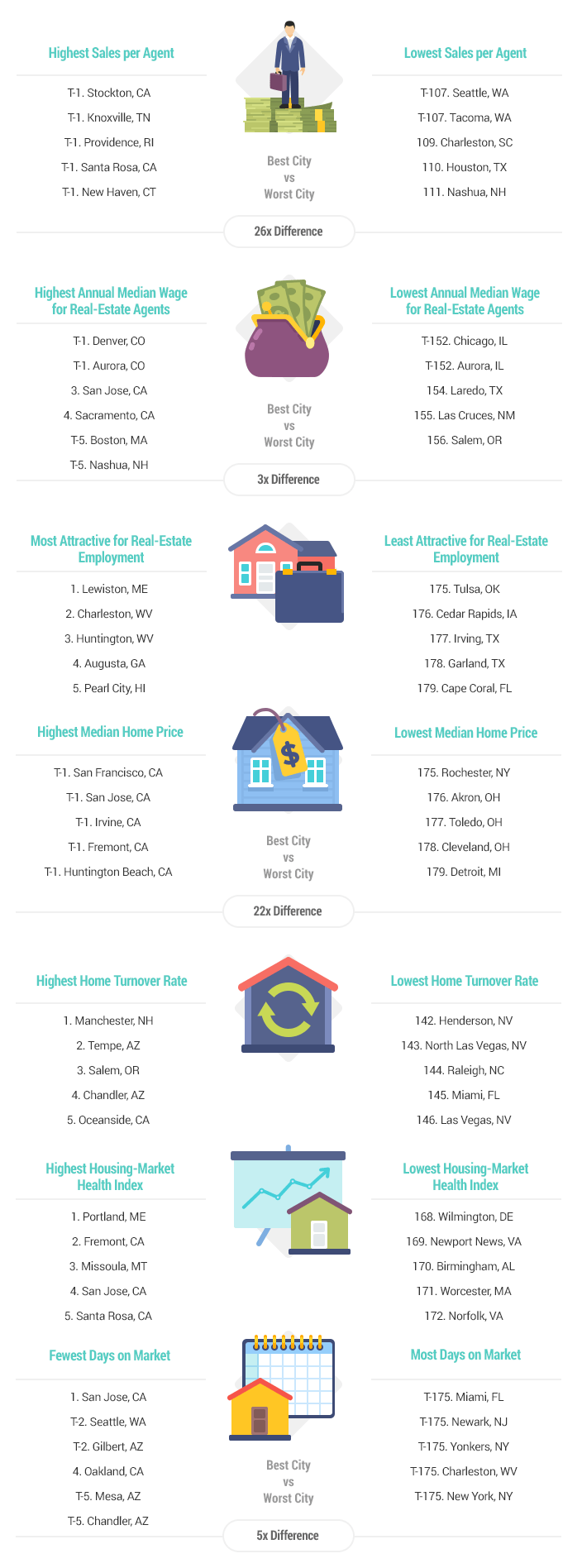
Keep these three key differences in mind when choosing between an agent or a realty broker: the experience level and the fee structure. While agents earn a commission, brokers have a fiduciary obligation to their clients. A broker also has a higher level competence, which can be a problem in difficult situations. A broker can often be the best person to represent your best interests in purchasing a property.
Real estate agents have more experience
Agents don't have the same training and experience as real estate brokers. Many agents don't pursue the designations of Principal Broker or Licensed Associated Real Estate broker, so they might have a bump in their title. If you are new to real estate, a large brokerage is probably the best option. Many large brokerages offer training classes to new agents. This allows you to build your brand, reputation, and credibility within the company. Here are three reasons why brokers have more experience than agents.

Although they are not licensed as brokers, agents often have more experience. Real estate brokers are more experienced and have more designations and specializations. Brokers have greater accountability for their agents. Agents are not legally accountable for the actions and decisions of their colleagues. Additionally, brokers are more likely have more experience which makes them a better choice for clients. However, it is important to note that agents do not have as much financial responsibility as brokers.
They have a fiduciary duty to their clients
Real estate has an inherent conflict of interests between the seller or broker. In small towns, it is possible that there is not a competing brokerage company. This means that neither client will have to be held responsible for the broker's conflict of interest. This is called "dual representing." State laws have been passed in order to protect both sides' interests. In Illinois, for example, the broker's fiduciary duty to the seller extends to the buyer, and the agent's duty to the buyer is no longer applicable.
Fiduciary duty to clients means that the broker or agent must act in their client's best interest. Fiduciary duty is more than their usual obligations to clients. It means that they must represent their clients' best interests. Fiduciary duties include loyalty, transparency and accounting as well as reasonable care. Some of these are self-explanatory, but others require more careful consideration.
They are paid by commission
Agents and brokers are divided a percentage of their commission based on their experiences. New agents typically receive less than more experienced agents. Brokers may sometimes deduct the commission off the sale price. The top-producing agents receive 100% commissions while all others get a split. Some brokers offer a fixed percentage split, while some others offer a flexible commission split based on their preferences and experience.

Some commissions may be split among multiple parties but this is rare. One example would be that the selling agent keeps the entire 6% commission and the broker who found a buyer splits the commission with the sponsoring agency. A buyer might pay more than the listing agent for a commission, but they split 6%. An example of this is a $12,000 commission that an agent receives for selling a house. The broker's commission is $4,800 and the agent's fee $7,200.
FAQ
What is the cost of replacing windows?
Replacement windows can cost anywhere from $1,500 to $3,000. The cost of replacing all your windows will vary depending upon the size, style and manufacturer of windows.
What are the pros and cons of a fixed-rate loan?
Fixed-rate mortgages guarantee that the interest rate will remain the same for the duration of the loan. This ensures that you don't have to worry if interest rates rise. Fixed-rate loans have lower monthly payments, because they are locked in for a specific term.
How do I get rid termites & other pests from my home?
Termites and many other pests can cause serious damage to your home. They can cause severe damage to wooden structures, such as decks and furniture. A professional pest control company should be hired to inspect your house regularly to prevent this.
Should I use an mortgage broker?
A mortgage broker may be able to help you get a lower rate. Brokers can negotiate deals for you with multiple lenders. Brokers may receive commissions from lenders. Before you sign up, be sure to review all fees associated.
Statistics
- Private mortgage insurance may be required for conventional loans when the borrower puts less than 20% down.4 FHA loans are mortgage loans issued by private lenders and backed by the federal government. (investopedia.com)
- This seems to be a more popular trend as the U.S. Census Bureau reports the homeownership rate was around 65% last year. (fortunebuilders.com)
- When it came to buying a home in 2015, experts predicted that mortgage rates would surpass five percent, yet interest rates remained below four percent. (fortunebuilders.com)
- Based on your credit scores and other financial details, your lender offers you a 3.5% interest rate on loan. (investopedia.com)
- Some experts hypothesize that rates will hit five percent by the second half of 2018, but there has been no official confirmation one way or the other. (fortunebuilders.com)
External Links
How To
How to Manage a Property Rental
While renting your home can make you extra money, there are many things that you should think about before making the decision. We'll help you understand what to look for when renting out your home.
Here are the basics to help you start thinking about renting out a home.
-
What do I need to consider first? Before you decide if you want to rent out your house, take a look at your finances. If you have debts, such as credit card bills or mortgage payments, you may not be able to afford to pay someone else to live in your home while you're away. Your budget should be reviewed - you may not have enough money to cover your monthly expenses like rent, utilities, insurance, and so on. This might be a waste of money.
-
How much is it to rent my home? There are many factors that go into the calculation of how much you can charge to let your home. These factors include the location, size and condition of your home, as well as season. Prices vary depending on where you live so it's important that you don't expect the same rates everywhere. Rightmove estimates that the market average for renting a 1-bedroom flat in London costs around PS1,400 per monthly. This means that if you rent out your entire home, you'd earn around PS2,800 a year. While this isn't bad, if only you wanted to rent out a small portion of your house, you could make much more.
-
Is it worth it? You should always take risks when doing something new. But, if it increases your income, why not try it? Be sure to fully understand what you are signing before you sign anything. Not only will you be spending more time away than your family, but you will also have to maintain the property, pay for repairs and keep it clean. Before signing up, be sure to carefully consider these factors.
-
Are there any advantages? You now know the costs of renting out your house and feel confident in its value. Now, think about the benefits. You have many options to rent your house: you can pay off debt, invest in vacations, save for rainy days, or simply relax from the hustle and bustle of your daily life. It's more fun than working every day, regardless of what you choose. And if you plan ahead, you could even turn to rent into a full-time job.
-
How can I find tenants? Once you've made the decision that you want your property to be rented out, you must advertise it correctly. Make sure to list your property online via websites such as Rightmove. Once potential tenants contact you, you'll need to arrange an interview. This will help you assess their suitability and ensure they're financially stable enough to move into your home.
-
How can I make sure that I'm protected? If you are worried about your home being empty, it is important to make sure you have adequate protection against fire, theft, and damage. In order to protect your home, you will need to either insure it through your landlord or directly with an insured. Your landlord may require that you add them to your additional insured. This will cover any damage to your home while you are not there. If you are not registered with UK insurers or if your landlord lives abroad, however, this does not apply. In such cases you will need a registration with an international insurance.
-
Sometimes it can feel as though you don’t have the money to spend all day looking at tenants, especially if there are no other jobs. However, it is important that you advertise your property in the best way possible. Make sure you have a professional looking website. Also, make sure to post your ads online. You'll also need to prepare a thorough application form and provide references. While some prefer to do all the work themselves, others hire professionals who can handle most of it. You'll need to be ready to answer questions during interviews.
-
What happens once I find my tenant If there is a lease, you will need to inform the tenant about any changes such as moving dates. If you don't have a lease, you can negotiate length of stay, deposit, or other details. Keep in mind that you will still be responsible for paying utilities and other costs once your tenancy ends.
-
How do I collect my rent? You will need to verify that your tenant has actually paid the rent when it comes time to collect it. If your tenant has not paid, you will need to remind them. After sending them a final statement, you can deduct any outstanding rent payments. You can always call the police to help you locate your tenant if you have difficulty getting in touch with them. They won't normally evict someone unless there's been a breach of contract, but they can issue a warrant if necessary.
-
What can I do to avoid problems? Renting out your house can make you a lot of money, but it's also important to stay safe. Install smoke alarms, carbon monoxide detectors, and security cameras. It is important to check that your neighbors allow you leave your property unlocked at nights and that you have sufficient insurance. Finally, you should never let strangers into your house, even if they say they're moving in next door.